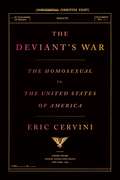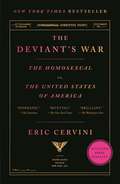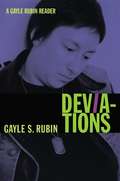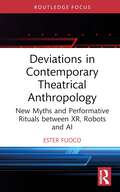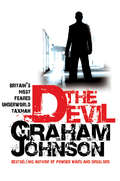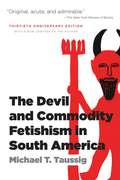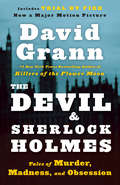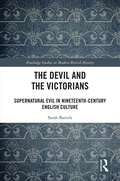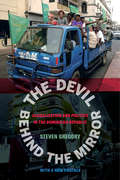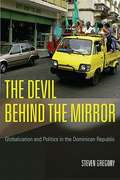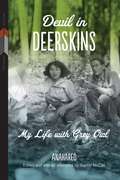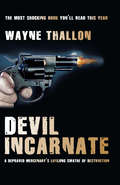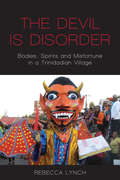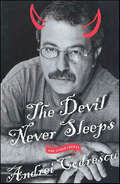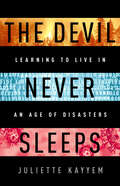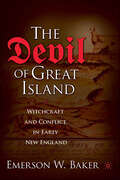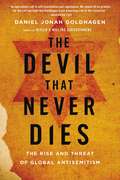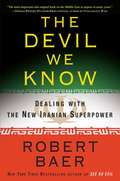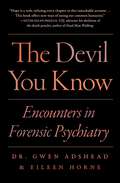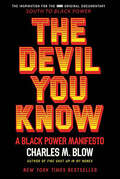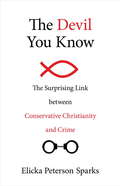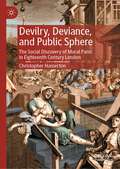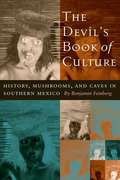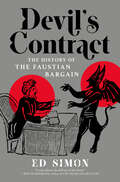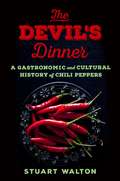- Table View
- List View
The Deviant's War: The Homosexual Vs. The United States of America
by Eric CerviniFrom a young Harvard- and Cambridge-trained historian, the secret history of the fight for gay rights that began a generation before Stonewall. <p><p> In 1957, Frank Kameny, a rising astronomer working for the U.S. Defense Department in Hawaii, received a summons to report immediately to Washington, D.C. The Pentagon had reason to believe he was a homosexual, and after a series of humiliating interviews, Kameny, like countless gay men and women before him, was promptly dismissed from his government job. Unlike many others, though, Kameny fought back. <p> Based on firsthand accounts, recently declassified FBI records, and forty thousand personal documents, Eric Cervini's The Deviant's War unfolds over the course of the 1960s, as the Mattachine Society of Washington, the group Kameny founded, became the first organization to protest the systematic persecution of gay federal employees. It traces the forgotten ties that bound gay rights to the Black Freedom Movement, the New Left, lesbian activism, and trans resistance. Above all, it is a story of America (and Washington) at a cultural and sexual crossroads; of shocking, byzantine public battles with Congress; of FBI informants; murder; betrayal; sex; love; and ultimately victory.
The Deviant's War: The Homosexual vs. the United States of America
by Eric CerviniFrom a young Harvard- and Cambridge-trained historian, the secret history of the fight for gay rights that began a generation before Stonewall. <p><p> In 1957, Frank Kameny, a rising astronomer working for the U.S. Defense Department in Hawaii, received a summons to report immediately to Washington, D.C. The Pentagon had reason to believe he was a homosexual, and after a series of humiliating interviews, Kameny, like countless gay men and women before him, was promptly dismissed from his government job. Unlike many others, though, Kameny fought back. <p> Based on firsthand accounts, recently declassified FBI records, and forty thousand personal documents, Eric Cervini's The Deviant's War unfolds over the course of the 1960s, as the Mattachine Society of Washington, the group Kameny founded, became the first organization to protest the systematic persecution of gay federal employees. It traces the forgotten ties that bound gay rights to the Black Freedom Movement, the New Left, lesbian activism, and trans resistance. Above all, it is a story of America (and Washington) at a cultural and sexual crossroads; of shocking, byzantine public battles with Congress; of FBI informants; murder; betrayal; sex; love; and ultimately victory. <p> <b>A New York Times Bestseller</b>
Deviations: A Gayle Rubin Reader
by Gayle S. RubinDeviations is the definitive collection of writing by Gayle S. Rubin, a pioneering theorist and activist in feminist, lesbian and gay, queer, and sexuality studies since the 1970s. Rubin first rose to prominence in 1975 with the publication of "The Traffic in Women," an essay that had a galvanizing effect on feminist thinking and theory. In another landmark piece, "Thinking Sex," she examined how certain sexual behaviors are constructed as moral or natural, and others as unnatural. That essay became one of queer theory's foundational texts. <P><P>Along with such canonical work, Deviations features less well-known but equally insightful writing on subjects such as lesbian history, the feminist sex wars, the politics of sadomasochism, crusades against prostitution and pornography, and the historical development of sexual knowledge. In the introduction, Rubin traces her intellectual trajectory and discusses the development and reception of some of her most influential essays. Like the book it opens, the introduction highlights the major lines of inquiry pursued for nearly forty years by a singularly important theorist of sex, gender, and culture.
Deviations in Contemporary Theatrical Anthropology: New Myths and Performative Rituals between XR, Robots and AI (ISSN)
by Ester FuocoThis book refers to the artistic deviation from dominant goals in a social system or from means considered legitimate in that system.This book explores a "New Humanism" in the performing arts, unique in the sense of human's ability to co-create and communicate beyond spatial and temporal boundaries, wars, and pandemics, through artistic deviations carried out by machines and through the Extended Reality. Through the lens of anthropology and aesthetics, this study selects useful case studies to demonstrate this phenomenon of performative symphonises, in which the experimentation of AI-driven creativity and the new human-robot interaction (HRI) lead to philosophical inquiries about the nature of creativity, intelligence, and the definition of art itself. These shifts in paradigms invite us to reconsider established concepts and explore new perspectives on the relationship between technology, art, and the human experience.This book will be of great interest to students and scholars in theatre and performance studies, anthropology, and digital humanities.
The Devil: Britain's Most Feared Underworld Taxman
by Graham JohnsonDrug dealers beware. The Devil is coming to get you. Gangster Stephen French invented the perfect crime: robbing drug barons of their huge fortunes. In SAS-style swoops, French raided their fortified mansions and tortured them with horrifying violence until they paid up. Through 'taxing' the richest and most powerful crimelords in the UK, he netted over £20 million.French was no ordinary criminal. He was a world-champion fighter, he studied psychology at university to master mind-control techniques, and he used the teachings of Machiavelli and samurai warriors to outwit his enemies. The Devil also reveals French's complex relationship with Curtis Warren, the wealthiest criminal in British history. The two were childhood pals, then partners and finally bitter enemies.Now a legitimate businessman, French built up a multimillion-pound empire. Having eventually turned his back on his former life, he is now seeking to set the record straight.
The Devil and Commodity Fetishism in South America
by Michael T. TaussigIn this classic book, Michael Taussig explores the social significance of the devil in the folklore of contemporary plantation workers and miners in South America. Grounding his analysis in Marxist theory, Taussig finds that the fetishization of evil, in the image of the devil, mediates the conflict between precapitalist and capitalist modes of objectifying the human condition. He links traditional narratives of the devil-pact, in which the soul is bartered for illusory or transitory power, with the way in which production in capitalist economies causes workers to become alienated from the commodities they produce. A new chapter for this anniversary edition features a discussion of Walter Benjamin and Georges Bataille that extends Taussig's ideas about the devil-pact metaphor.
The Devil and Sherlock Holmes: Tales Of Murder, Madness And Obsession
by David GrannFrom the #1 New York Times bestselling author of Killers of the Flower Moon and The Wager—and one of the most gifted reporters and storytellers of his generation—comes a &“horrifying, hilarious, and outlandish&” (Entertainment Weekly) collection of gripping true crime mysteries about people whose obsessions propel them into unfathomable and often deadly circumstances. "[Grann is] one of the preeminent adventure and true-crime writers working today."—New York Magazine Whether David Grann is investigating a mysterious murder, tracking a chameleon-like con artist, or hunting an elusive giant squid, he has proven to be a superb storyteller. In The Devil and Sherlock Holmes, Grann takes the reader around the world, revealing a gallery of rogues and heroes with their own particular fixations who show that truth is indeed stranger than fiction.Look for David Grann&’s latest bestselling book, The Wager!
The Devil and the Victorians: Supernatural Evil in Nineteenth-Century English Culture (Routledge Studies in Modern British History)
by Sarah BartelsIn recent decades, there has been a growing recognition of the significance of the supernatural in a Victorian context. Studies of nineteenth-century spiritualism, occultism, magic, and folklore have highlighted that Victorian England was ridden with spectres and learned magicians. Despite this growing body of scholarship, little historiographical work has addressed the Devil. This book demonstrates the significance of the Devil in a Victorian context, emphasising his pervasiveness and diversity. Drawing on a rich array of primary material, including theological and folkloric works, fiction, newspapers and periodicals, and broadsides and other ephemera, it uses the diabolic to explore the Victorians' complex and ambivalent relationship with the supernatural. Both the Devil and hell were theologically contested during the nineteenth century, with an increasing number of both clergymen and laypeople being discomfited by the thought of eternal hellfire. Nevertheless, the Devil continued to play a role in the majority of English denominations, as well as in folklore, spiritualism, occultism, popular culture, literature, and theatre. The Devil and the Victorians will appeal to readers interested in nineteenth-century English cultural and religious history, as well as the darker side of the supernatural.
The Devil behind the Mirror
by Steven GregoryIn The Devil behind the Mirror, Steven Gregory provides a compelling and intimate account of the impact that transnational processes associated with globalization are having on the lives and livelihoods of people in the Dominican Republic. Grounded in ethnographic fieldwork conducted in the adjacent towns of Boca Chica and Andrés, Gregory's study deftly demonstrates how transnational flows of capital, culture, and people are mediated by contextually specific power relations, politics, and history. He explores such topics as the informal economy, the making of a telenova, sex tourism, and racism and discrimination against Haitians, who occupy the lowest rung on the Dominican economic ladder. Innovative, beautifully written, and now updated with a new preface, The Devil behind the Mirror masterfully situates the analysis of global economic change in everyday lives.
The Devil Behind the Mirror: Globalization and Politics in the Dominican Republic
by Steven GregorySteven Gregory provides a compelling and intimate account of the impact that transnational processes associated with globalization are having on the lives and livelihoods of people in the Dominican Republic. Grounded in ethnographic fieldwork conducted in the adjacent towns of Boca Chica and Andrés, Gregory's study deftly demonstrates how transnational flows of capital, culture, and people are mediated by contextually specific power relations, politics, and history. He explores such topics as the informal economy, the making of a telenova, sex tourism, and racism and discrimination against Haitians, who occupy the lowest rung on the Dominican economic ladder. Innovative and beautifully written, The Devil behind the Mirror masterfully situates the analysis of global economic change in everyday lives.
Devil in Deerskins: My Life with Grey Owl
by Anahareo Sophie MccallAnahareo (1906-1985) was a Mohawk writer, environmentalist, and activist. She was also the wife of Grey Owl, aka Archie Belaney, the internationally celebrated writer and speaker who claimed to be of Scottish and Apache descent, but whose true ancestry as a white Englishman only became known after his death. Devil in Deerskins is Anahareo’s autobiography up to and including her marriage to Grey Owl. In vivid prose she captures their extensive travels through the bush and their work towards environmental and wildlife protection. Here we see the daily life of an extraordinary Mohawk woman whose independence, intellect and moral conviction had direct influence on Grey Owl’s conversion from trapper to conservationist. Though first published in 1972, Devil in Deerskins’s observations on indigeneity, culture, and land speak directly to contemporary audiences. Devil in Deerskins is the first book in the First Voices, First Texts series. This new edition includes forewords by Anahareo’s daughters, Katherine Swartile and Anne Gaskell, an afterword by Sophie McCall, and reintroduces readers to a very important but largely forgotten text by one of Canada’s most talented Aboriginal writers.
Devil Incarnate: A Depraved Mercenary's Lifelong Swathe of Destruction
by Wayne ThallonAthol Visser, or 'Ivan the Terrible', is a ruthless torture technician who has maimed and murdered his way around the globe. He killed his first victim at 16, his last at 60, and, in between, has been a mercenary, drug smuggler, gun runner and spy. In his own words, Visser takes us on a chilling journey through his memory bank of horrors and gives his account of one of the most high-profile assassinations of the 1980s, that of the Swedish prime minister Olof Palme. Visser's chaotic instincts led him from one deadly right-wing organisation to the next, before he rose to the highest ranks of the CCB, South Africa's foreign assassination unit. He was posted to London, where he drew up his plans to eliminate key opponents of apartheid. Devil Incarnate is the disturbing story of a degenerate, evil man who killed for pleasure and then adopted it as a profession. In the end, now ravaged by Aids, he has taken it upon himself to find out the reasons behind his unforgivable actions.
The Devil is Disorder: Bodies, Spirits and Misfortune in a Trinidadian Village
by Rebecca LynchWhat role might the Devil have in health and illness? The Devil is Disorder explores constructions of the body, health, illness and wider misfortune in a Trinidadian village where evangelical Christianity is growing in popularity. Based on long-term ethnography and locating the village in historical and global context, the book takes a nuanced cosmological approach to situate evangelical Christian understandings as shaping and being shaped by their context and, in the process, shaping individuals themselves. As people move from local to global subjects, health here stretches beyond being a matter of individual bodies and is connected to worldwide flows and networks, spirit entities, and expansive moral orders.
The Devil Never Sleeps: And Other Essays
by Andrei CodrescuThe Devil is alive and well and living in America, Andrei Codrescu tells us, and with good reason. Nowhere else in the world--not even in Codrescu's native Transylvania--is he taken quite as seriously. When Codrescu gently derided the fundamentalist Christian belief in Rapture ("a pre-apocalyptic event during which all true believers would be suctioned off to heaven in a single woosh") in one of his commentaries on National Public, NPR received forty thousand letters in a protest spearheaded by Ralph Reed of the Christian Coalition. Codrescu was warned to "stay away from eschatology."Thankfully for us, he hasn't. In The Devil Never Sleeps, one of America's shrewdest social critics sets out to uncover the Devil's most modern and insidiously banal incarnations. Once easily recognizable by his horns, tail, and propensity for plague, today's Devil has become embedded in every fiber of our culture. Discussing everything from rock 'n' roll to William Burroughs to New Orleans bars to the Demon of Prosperity, Codrescu mockingly unmasks Old Nick as the opportunistic technocrat he really is. Embracing cell phones, cable access, and cyberspace, the ubiquitous Devil of secular culture embodies the true evil facing us today--banality.In a world teeming with distractions, we are still more than capable of being bored to death. Tormented as much by insomnia and its ravages as the Devil (perhaps they are one and the same), we've become as twenty-four-hour society, swinging desperately between tedium and terror and sleeping fitfully, if at all. As Codrescu points out, the Devil never sleeps because we just won't let him.With his characteristic charm and playful exuberance, Andrei Codrescu has successfully teased the Devil out from the darkest recesses and comic excesses of the human experience. The Devil Never Sleeps is his most wonderfully perverse book yet.
The Devil Never Sleeps: Learning to Live in an Age of Disasters
by Juliette KayyemAn urgent, transformative guide to dealing with disasters from one of today&’s foremost thinkers in crisis management.The future may still be unpredictable, but nowadays, disasters are not. We live in a time of constant, consistent catastrophe, where things more often go wrong than they go right. So why do we still fumble when disaster hits? Why are we always one step behind?In The Devil Never Sleeps, Juliette Kayyem lays the groundwork for a new approach to dealing with disasters. Presenting the basic themes of crisis management, Kayyem amends the principles we rely on far too easily. Instead, she offers us a new framework to anticipate the &“devil&’s&” inevitable return, highlighting the leadership deficiencies we need to overcome and the forward thinking we need to harness. It&’s no longer about preventing a disaster from occurring, but learning how to use the tools at our disposal to minimize the consequences when it does.Filled with personal anecdotes and real-life examples from natural disasters like the California wildfires to man-made ones like the Boeing 737 MAX crisis, The Devil Never Sleeps is a guide for governments, businesses, and individuals alike on how to alter our thinking so that we can develop effective strategies in the face of perpetual catastrophe.
The Devil of Great Island: Witchcraft and Conflict in Early New England
by Emerson W. BakerIn 1682, ten years before the infamous Salem witch trials, the town of Great Island, New Hampshire, was plagued by mysterious events: strange, demonic noises; unexplainable movement of objects; and hundreds of stones that rained upon a local tavern and appeared at random inside its walls. Town residents blamed what they called "Lithobolia" or "the stone-throwing devil." In this lively account, Emerson Baker shows how witchcraft hysteria overtook one town and spawned copycat incidents elsewhere in New England, prefiguring the horrors of Salem. In the process, he illuminates a cross-section of colonial society and overturns many popular assumptions about witchcraft in the seventeenth century.
The Devil That Never Dies: The Rise and Threat of Global Antisemitism
by Daniel Jonah GoldhagenA groundbreaking--and terrifying--examination of the widespread resurgence of antisemitism in the 21st century, by the prize-winning and #1 internationally bestselling author of Hitler's Willing Executioners.Antisemitism never went away, but since the turn of the century it has multiplied beyond what anyone would have predicted. It is openly spread by intellectuals, politicians and religious leaders in Europe, Asia, the Arab world, America and Africa and supported by hundreds of millions more. Indeed, today antisemitism is stronger than any time since the Holocaust. In THE DEVIL THAT NEVER DIES, Daniel Jonah Goldhagen reveals the unprecedented, global form of this age-old hatred; its strategic use by states; its powerful appeal to individuals and groups; and how technology has fueled the flames that had been smoldering prior to the millennium. A remarkable work of intellectual brilliance, moral stature, and urgent alarm, THE DEVIL THAT NEVER DIES is destined to be one of the most provocative and talked-about books of the year.
The Devil We Know: Dealing with the New Iranian Superpower
by Robert BaerOver the past thirty years, while the United States has turned either a blind or dismissive eye, Iran has emerged as a nation every bit as capable of altering America's destiny as traditional superpowers Russia and China. Indeed, one of this book's central arguments is that, in some ways, Iran's grip on America's future is even tighter.As ex-CIA operative Robert Baer masterfully shows, Iran has maneuvered itself into the elite superpower ranks by exploiting Americans' false perceptions of what Iran is--by letting us believe it is a country run by scowling religious fanatics, too preoccupied with theocratic jostling and terrorist agendas to strengthen its political and economic foundations.The reality is much more frightening--and yet contained in the potential catastrophe is an implicit political response that, if we're bold enough to adopt it, could avert disaster.Baer's on-the-ground sleuthing and interviews with key Middle East players--everyone from an Iranian ayatollah to the king of Bahrain to the head of Israel's internal security--paint a picture of the centuries-old Shia nation that is starkly the opposite of the one normally drawn. For example, Iran's hate-spouting President Ahmadinejad is by no means the true spokesman for Iranian foreign policy, nor is Iran making it the highest priority to become a nuclear player. Even so, Baer has discovered that Iran is currently engaged in a soft takeover of the Middle East, that the proxy method of war-making and co-option it perfected with Hezbollah in Lebanon is being exported throughout the region, that Iran now controls a significant portion of Iraq, that it is extending its influence over Jordan and Egypt, that the Arab Emirates and other Gulf States are being pulled into its sphere, and that it will shortly have a firm hold on the world's oil spigot.By mixing anecdotes with information gleaned from clandestine sources, Baer superbly demonstrates that Iran, far from being a wild-eyed rogue state, is a rational actor--one skilled in the game of nations and so effective at thwarting perceived Western colonialism that even rival Sunnis relish fighting under its banner.For U.S. policy makers, the choices have narrowed: either cede the world's most important energy corridors to a nation that can match us militarily with its asymmetric capabilities (which include the use of suicide bombers)--or deal with the devil we know. We might just find that in allying with Iran, we'll have increased not just our own security but that of all Middle East nations.The alternative--to continue goading Iran into establishing hegemony over the Muslim world--is too chilling to contemplate.From the Hardcover edition.
The Devil You Know: Encounters in Forensic Psychiatry
by Gwen Adshead Eileen HorneIn this &“unmissable book&” (The Guardian), an internationally renowned forensic psychiatrist and psychotherapist demonstrates the remarkable human capacity for radical empathy, change, and redemption.What drives someone to commit an act of terrible violence? Drawing from her thirty years of experience in providing therapy to people in prisons and secure hospitals who have committed serious offenses, Dr. Gwen Adshead provides fresh and surprising insights into violence and the mind. Through a collaboration with coauthor Eileen Horne, Dr. Adshead brings her extraordinary career to life in a series of unflinching portraits. Alongside doctor and patient, we discover what human cruelty, ranging from serial homicide to stalking, arson or sexual offending, means to perpetrators, experiencing firsthand how minds can change when the people some might label as &“evil&” are able to take responsibility for their life stories and get to know their own minds. With outcomes ranging from hope to despair, from denial to recovery, these men and women are revealed in all their complexity and shared humanity. In this era of mass incarceration, deep cuts in mental health care and extreme social schisms, this book offers a persuasive argument for compassion over condemnation. Moving, thought-provoking, and brilliantly told, The Devil You Know is a rare and timely book with the power to transform our ideas about cruelty and violence, and to radically expand the limits of empathy. &“A welcome contribution to the literature of crime and rehabilitation&” (Kirkus Reviews).
The Devil You Know: A Black Power Manifesto
by Charles M. BlowINSTANT NEW YORK TIMES BESTSELLERA New York Times Editor’s Choice | A Kirkus Best Nonfiction Book of the YearThe Inspiration for the HBO Original Documentary South to Black PowerFrom journalist and New York Times bestselling author Charles Blow comes a powerful manifesto and call to action, "a must-read in the effort to dismantle deep-seated poisons of systemic racism and white supremacy" (San Francisco Chronicle).Race, as we have come to understand it, is a fiction; but, racism, as we have come to live it, is a fact. The point here is not to impose a new racial hierarchy, but to remove an existing one. After centuries of waiting for white majorities to overturn white supremacy, it seems to me that it has fallen to Black people to do it themselves.Acclaimed columnist and author Charles Blow never wanted to write a “race book.” But as violence against Black people—both physical and psychological—seemed only to increase in recent years, culminating in the historic pandemic and protests of the summer of 2020, he felt compelled to write a new story for Black Americans. He envisioned a succinct, counterintuitive, and impassioned corrective to the myths that have for too long governed our thinking about race and geography in America. Drawing on both political observations and personal experience as a Black son of the South, Charles set out to offer a call to action by which Black people can finally achieve equality, on their own terms.So what will it take to make lasting change when small steps have so frequently failed? It’s going to take an unprecedented shift in power. The Devil You Know is a groundbreaking manifesto, proposing nothing short of the most audacious power play by Black people in the history of this country. This book is a grand exhortation to generations of a people, offering a road map to true and lasting freedom.
The Devil You Know
by Elicka Peterson-SparksIn this trenchant examination of Christianity's dark side, a criminologist argues persuasively that high rates of violent crime in the United States can be correlated with Christian conservative attitudes, especially in regard to social mores and politics. Of particular concern is "Christian nationalism." Supporters of this movement argue that America was founded as a Christian nation and they work to install their fundamentalist brand of Christianity as the dominant factor in American political and social life. Far from being a fanatic outlier sect, this group is shown to have significant cultural influence, especially in the American South. Not coincidentally, the author suggests, the South also has the highest homicide rates. Noting the violent biblical passages often cited by religious conservatives, their sense of righteousness, their dogmatic mindset that tolerates no dissent, and their support for harshly punitive measures toward "sinners," Peterson Sparks shows that their worldview is the ideal seedbed for violence. Not only does this mindset make violent reactions in interpersonal conflicts more likely, the author says, but it exacerbates the problems of the criminal justice system by advocating policies that create high incarceration rates. The author also devotes particular attention to the victimization of women, children, and LGBT people, which follows from this rigid belief system. While not resorting to a blanket condemnation of Christianity or religion as a whole, Peterson Sparks issues a wake-up call regarding conservative Christianity's toxic mixture of fundamentalism, authoritarian politics, patriotism, and retributory justice.From the Hardcover edition.
Devilry, Deviance, and Public Sphere: The Social Discovery of Moral Panic in Eighteenth Century London
by Christopher HamertonDevilry, Deviance, and Public Sphere draws on criminology and social theory to explore and expand social historical themes in the analysis of perceptions of deviance and crime in the eighteenth century. Developing the theoretical device of Folk Devils and Moral Panics, instigated by Stanley Cohen and developed by Erich Goode and Nachman Ben-Yehuda, the book explores the social discovery of, and public response to, crime and deviance in that period. Detailed contemporary case studies of youth violence, sexual deviance, and substance abuse are used to argue that Hanoverian London and its novel media can be identified as the initiating historical site for what might now be termed public order moral panics. In doing so, Hamerton provides a vivid historical lineage of moral panic which traverses much of the long eighteenth century. The book considers social change, allowing for points of theoretical convergence and divergence to be observed, whilst exploring historical models of public opinion, media, deviance and crime alongside the unique character and power located within the burgeoning Metropolis. Devilry, Deviance, and Public Sphere seeks to make an important contribution to the understanding of both moral panic theory and the historiography of crime and deviance, and posits that the current discourse on folk devils and moral panics can be extended and enriched via the exploration of the moral crises of earlier centuries.
The Devil's Book of Culture: History, Mushrooms, and Caves in Southern Mexico
by Benjamin FeinbergSince the 1950s, the Sierra Mazateca of Oaxaca, Mexico, has drawn a strange assortment of visitors and pilgrims—schoolteachers and government workers, North American and European spelunkers exploring the region's vast cave system, and counterculturalists from hippies (John Lennon and other celebrities supposedly among them) to New Age seekers, all chasing a firsthand experience of transcendence and otherness through the ingestion of psychedelic mushrooms "in context" with a Mazatec shaman. Over time, this steady incursion of the outside world has significantly influenced the Mazatec sense of identity, giving rise to an ongoing discourse about what it means to be "us" and "them." In this highly original ethnography, Benjamin Feinberg investigates how different understandings of Mazatec identity and culture emerge through talk that circulates within and among various groups, including Mazatec-speaking businessmen, curers, peasants, intellectuals, anthropologists, bureaucrats, cavers, and mushroom-seeking tourists. Specifically, he traces how these groups express their sense of culture and identity through narratives about three nearby yet strange discursive "worlds"—the "magic world" of psychedelic mushrooms and shamanic practices, the underground world of caves and its associated folklore of supernatural beings and magical wealth, and the world of the past or the past/present relationship. Feinberg's research refutes the notion of a static Mazatec identity now changed by contact with the outside world, showing instead that identity forms at the intersection of multiple transnational discourses.
Devil's Contract: The History of the Faustian Bargain
by Ed SimonA devilishly fascinating tour of the Faustian bargain through the ages, from brimstone to blues and beyond ...From ancient times to the modern world, the idea of the Faustian bargain—the exchange of one's soul in return for untold riches and power—has exerted a magnetic pull upon our collective imaginations.Scholar Ed Simon takes us on a historical tour of the Faustian bargain, from the Bible to blues, and illustrates how the impulse fto sacrifice our principles in exchange for power is present in all kinds of social ills, from colonialism to nuclear warfare, from social media to climate change to AI, and beyond. In doing so, Simon conveys just how much the Faustian bargain shows us about power and evil ... and ourselves.
The Devil's Dinner: A Gastronomic and Cultural History of Chili Peppers
by Stuart WaltonStuart Walton's The Devil's Dinner looks at the history of hot peppers, their culinary uses through the ages, and the significance of spicy food in an increasingly homogenous world.The Devil's Dinner is the first authoritative history of chili peppers. There are countless books on cooking with chilies, but no book goes into depth about the biological, gastronomical, and cultural impact this forbidden fruit has had upon people all over the world. The story has been too hot to handle.A billion dollar industry, hot peppers are especially popular in the United States, where a superhot movement is on the rise. Hot peppers started out in Mexico and South America, came to Europe with returning Spanish travelers, lit up Iberian cuisine with piri-piri and pimientos, continued along eastern trade routes, boosted mustard and pepper in cuisines of the Indian subcontinent, then took overland routes to central Europe in the paprika of Hungarian and Austrian dumplings, devilled this and devilled that… they've been everywhere!The Devil's Dinner tells the history of hot peppers and captures the rise of the superhot movement.
